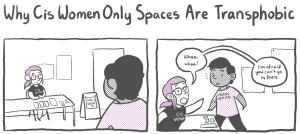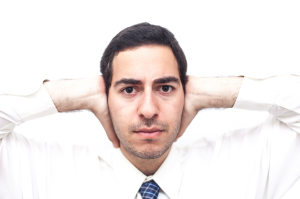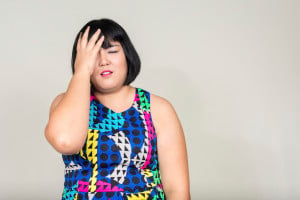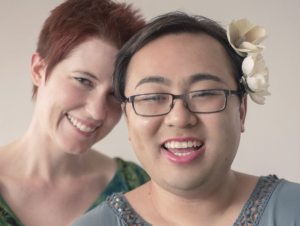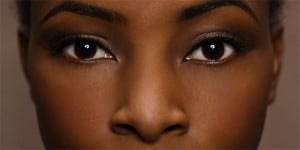
Source: Feminspire
At the time I’m writing this, it’s the third week of August, and my online world is bombarded with thumbnails and links encouraging me to watch Nicki Minaj’s “Anaconda” video.
Sometimes I’m tempted to turn the feminist part of my brain off and either ignore pop culture entirely or watch the video out of boredom, think, “Wee, butts,” and move on with my life.
But I can’t do that.
I’m a feminist killjoy – someone who feels compelled to spend a lot of time thinking about how the images that pervade our culture affect our culture. And so I can’t watch “Anaconda” without thinking about the implications of a black woman taking ownership of her sexuality in a provocative way in a society already inundated with oversexualized images of black women in an industry that caters to the white male gaze in a capitalist system that… you get the point.
But there’s a midpoint between the lazy and feminist portions of my brain that wants to say, “Oh yes, this video is feminist because I like it.”
Because then I wouldn’t have to be critical.
I wouldn’t have to think about the possible problematic implications of the video’s existence, or how I might be complicit in them, while attempting to use the word “feminism” as a way to avoid further discussion.
This is the problem I have with centering conversations around whether or not someone or something is feminist – as in: Is “Anaconda” a body-positive ode to the anatomical wonders of big booty women separate of the male gaze, or is it a calculated ploy for money and attention that sets women back? Is it feminist?
Am I a feminist? Are you a feminist? Do you or I or Nicki Minaj have the right to align ourselves with a movement that aims to change a society that we can’t help being a part of?
Spoiler alert: Yes, we can. But not carelessly.
Feminism as More Than a Label
I think “Is x feminist?” is the wrong question to be asking when it comes to pretty much anything, really.
Because if you got a cross section of all self-identified feminists in a room together and asked them what their opinions were on politics, religion, sexuality, or gender expression, a lot of what you’d hear would be contradictory.
This doesn’t necessarily mean that they’re incorrectly using the word “feminist” (though some probably are). It simply illustrates the fact that feminism is not a monolithic movement in which the word “feminist” describes a very specific type of person.
A feminist, broadly speaking, is someone who works against systems that privilege cisgender men in order to promote gender equality and the rights of women.
Whether or not someone can or should twerk, leave their body hair intact, or wear heels and still call themselves a feminist isn’t as obvious or clear.
And more importantly, a person can have all the feminist cred in the world — volumes of feminist theory on their shelves, years of experience doing women’s rights activism, and bell hooks on speed dial — and still do things that play into patriarchy and are harmful to women.
Because there is no single unwavering state called “being a feminist.”
People practice their feminism while being human, soaking up the same images and sounds as the rest of society, and being ignorant of issues that fall into their moral sidelines. Not to mention the iterations of feminism that fail to be intersectional — those that exclude or fail to serve women of color, women who are trans, women who are poor, and the list goes on.
So yeah, there are a lot of things that bear the feminist label that I, as a feminist, don’t really support: “Lean In” feminism, trans-exclusionary feminism, and feminism centered on the needs and concerns of straight white women are all things I’m critical of.
But I’m not going to wrestle the term “feminism” away from them and pretend that my own feminism can’t be problematic or exclusionary.
So when people call themselves feminists, they’re taking on more than an identity, label, or ideology. They’re marking themselves as part of a movement that’s made necessary strides in advancing women’s rights, a movement that isn’t perfect or unilateral and can’t be.
Anyone can sincerely say they’re a feminist.
But calling oneself a feminist isn’t the meaningful part— how people actually incorporate feminism into their daily lives and work is.
Impact Is Greater Than Intentions
I’m bringing Nicki Minaj back (I promise I’m not a fan or stan, so hear me out here).
I see her public image as an example of how a person can do and say positive, feminist-y things. She shuts down slut shaming and body policing in interviews, succeeds in a male-dominated genre, and calls out sexist and racist double standards — alongside more problematic things, like calling women “nappy headed hoes” in “Did It On ‘Em” and playing into a lot of harmful stereotypes about black women in her music and imagery.
When it comes to anything she does, I don’t care how many times she does well for herself, aligns herself with women’s rights, shares my skin tone, or does something that I personally like and approve of.
If I’m being aware, I know that she (and pretty much all people in the public eye) do things that warrant criticism. And even if a lot of the criticism surrounding a person is undue or motivated by racism or sexism, that doesn’t mean that feminist criticism should be shut down in their defense.
Because feminism doesn’t work as an abstract belief system in which we only examine the purity of a person’s intentions or our assumptions about their intentions. Feminism is only meaningful in terms of its impact.
And that’s why it’s the impact of actions we should be focusing on when it comes to approaching feminism. Not beliefs. Not declarations of feminism. Impact.
Calling yourself a feminist in a world that constantly maligns the term has an impact. Going beyond calling yourself a feminist and actually engaging the world in a way that runs counter to everything you’ve learned from your parents and your peers and the media has an impact.
Going further still and challenging your parents and your peers and the media to be more critical as well has an even broader impact. And there is a never-ending list of more you can do.
But it can’t all be done at once, and it may not all be done in a lifetime, and it often begins with knowing or saying “I am a feminist.” Or even, as Roxane Gay beautifully puts it here, a “bad feminist.”
So yeah, the label or identity of feminist matters. But not if that’s the stopping point.
Not if your desire for gender equality moves you to learn and do nothing about it. Not if our conversations about the world around us get stuck at “Can x be feminist?”
Because x can be feminist and missing the mark at the same time, as can you or I. Because we can be feminists without always being feminist, we can fail to cultivate self-awareness as we aim a critical eye at this or that aspect of our culture, and we can do better without beating ourselves up. Because feminists are made of what everyone else is made of — capable, malleable, fallible human stuff.
[do_widget id=”text-101″]
Jarune Uwujaren is a Contributing Writer for Everyday Feminism. A Nigerian-American recent graduate who’s stumbling towards a career in writing, Jarune can currently be found drifting around the DC metro area with a phone or a laptop nearby. When not writing for fun or profit, Jarune enjoys food, fresh air, good books, drawing, poetry, and sci-fi. Read their articles here.
Search our 3000+ articles!
Read our articles about:
Our online racial justice training
Used by hundreds of universities, non-profits, and businesses.
Click to learn more












